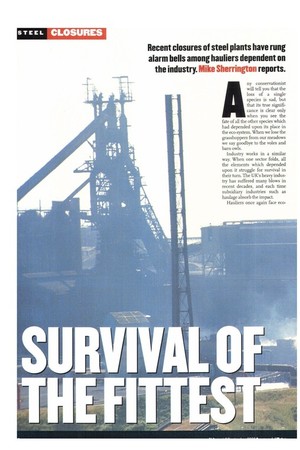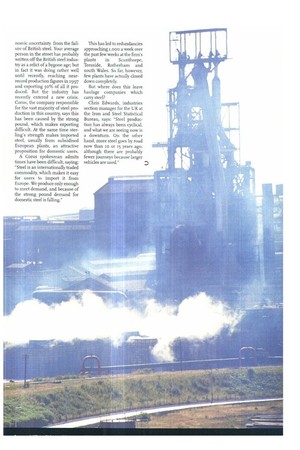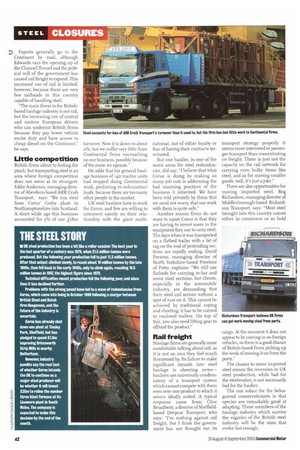Recent closures of steel plants have rung alarm bells among hauliers dependent on the industry. Mike Sherrington reports.
Page 42

Page 43

Page 44

If you've noticed an error in this article please click here to report it so we can fix it.
Any conservationist will tell you that the loss of a single species is sad, but that its true significance is clear only when you see the fate of all the other species which had depended upon its place in the eco-system. When we lose the grasshoppers from our meadows we say goodbye to the voles and barn owls.
Industry works in a similar way. When one sector folds, all the elements which depended upon it struggle for survival in their turn. The UK's heavy industry has suffered many blows in recent decades, and each time subsidiary industries such as haulage absorb the impact.
Hauliers once again face eco nomk uncertainty from the failure of British steel. Your average person in the street has probably written off the British steel industry as a relict of a bygone age; but in fact it was doing rather well until recently, reaching nearrecord production figures in 1997 and exporting 50% of all it produced. But the industry has recently entered a new crisis. Corus, the company responsible for the vast majority of steel production in this country, says this has been caused by the strong pound, which makes exporting difficult. At the same time sterling's strength makes imported steel, usually from subsidised European plants, an attractive proposition for domestic users.
A Corns spokesman admits times have been difficult, saying: "Steel is an internationally traded commodity, which makes it easy for users to import it from Europe. We produce only enough to meet demand, and because of the strong pound demand for domestic steel is falling." This has led to redundancies approaching r,000 a week over the past few weeks at the firm's plants in Scunthorpe, Teesside, Rotherham and south Wales. So far, however, few plants have actually closed down completely.
But where does this leave haulage companies which carry steel?
Chris Edwards, industries section manager for the UK at the Iron and Steel Statistical Bureau, says: "Steel production has always been cyclical, and what we are seeing now is a downturn. On the other hand, more steel goes by road now than ro or r5 years ago, although there are probably fewer journeys because larger vehicles are used." Exports generally go to the Continent by road, although Edwards says the opening up of the Channel Tunnel and the political will of the government has caused rail freight to expand. This increased use of rail is limited, however, because there are very few railheads in this country capable of handling steel.
"The main threat to the Britishbased haulage industry is not rail, but the increasing use of central and eastern European drivers who can undercut British firms because they pay lower vehicle excise duty and have access to cheap diesel on the Continent," he says.
Little compeetion
British firms admit to feeling the pinch, but transporting steel is an area where foreign competition does not seem at its strongest. Eddie Anderson, managing director of Aberdeen-based ARR Craib Transport, says: "We run steel from Corus' Corby plant in Northamptonshire into Scotland. A short while ago this business accounted for 5% of our r8m
turnover. Now it is down to about 2%, but we suffer very little from Continental firms encroaching on our business, possibly because of the route we operate."
He adds that his general haulage business of 140 tractive units had stopped doing Continental work, preferring to sub-contract loads, because there are too many other people in the market.
UK steel hauliers have to work for Corns, and few are willing to comment openly on their relationship with the giant multi
national, out of either loyalty or fear of having their contracts terminated.
But one haulier, in one of the worst areas for steel redundancies, did say: "I believe that what Corns is doing by making so many job cuts is addressing the bad manning practices of the business it inherited. We have been told privately by them that we need not worry, that our work with them is quite safe."
Another reason firms do not want to upset Cows is that they are having to invest more in the equipment they use to carry steel. The days when it was transported on a flatbed trailer with a bit of rag on the end of protruding sections are rapidly ending. David Preston, managing director of North Yorkshire-based Prestons of Potto, explains: We still use flatbeds for carrying re-bar and some steel sections, but clients, especially in the automobile industry, are demanding that their steel coil arrives without a spot of rust on it. This cannot be achieved by traditional roping and sheeting: it has to be carried in enclosed trailers. On top of this, you also need lifting gear to offload the product."
Rail freight
Haulage firms are generally more comfortable talking about rail, as it is not an area they feel much threatened by. Its failure to make significant inroads into steel haulage is cheering news— hauliers are universally condemnatory of a transport system which cannot compete with them even over one product to which it seems ideally suited. A typical response came from Clive Broadbent, a director of Sheffieldbased Deepcar Transport, who says: "I've nothing against rail freight, but I think the government has not thought out its
transport strategy properly. It seems more interested in passenger transport than concentrating on freight. There is just not the capacity on the rail network for carrying even bulky items like steel, and as for moving smaller goods, well, it's just a joke."
There are also opportunities for moving imported steel. Reg Richardson, managing director of Middlesborough-based Richardson Transport, says: Most steel brought into this country comes either in containers or as hold
cargo. At the moment it does not appear to be coming in on foreign vehicles, so there is a good chance of British-based firms picking up the work of moving it on from the ports."
The chance to move imported steel means the recession in UK steel production, while had for the steelworker, is not necessarily bad for the haulier.
The one solace for the beleaguered conservationists is that species are remarkably good at adapting. Those members of the haulage industry which survive the vagaries of the British steel industry will be the ones that evolve fast enough.












































































































